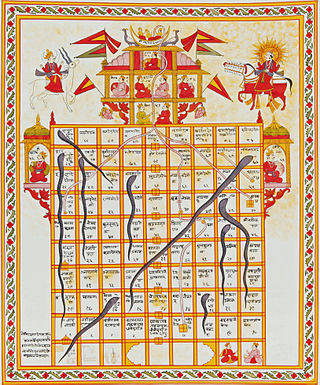
Snakes and ladders is a board game for two or more players regarded today as a worldwide classic. The game originated in ancient India invented by saint Dnyaneshwar as Moksha Patam, and was brought to the United Kingdom in the 1890s. It is played on a game board with numbered, gridded squares. A number of "ladders" and "snakes" are pictured on the board, each connecting two specific board squares. The object of the game is to navigate one's game piece, according to die rolls, from the start to the finish, helped by climbing ladders but hindered by falling down snakes.

Trouble is a board game in which players compete to be the first to send four pieces all the way around a board. It is based on a traditional game called "Frustration" played on a wooden board with indentations for marble playing pieces and rules similar to Parcheesi. Pieces are moved according to the roll of a die using a contained device called a "Pop-O-Matic".
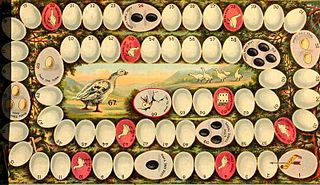
The Game of the Goose, also known as the Royal Game of the Goose is one of the first board games to be commercially manufactured. It is a race game, relying only on dice throws to dictate progression of the players. The board is often arranged in the form of a spiral, with game pieces starting on the most outward part. All spaces on the game board are numbered, with some depicting an illustration of either a goose or a hazard indicating a specified action. The aim of the game is to reach the 63rd space before any of the other players, while avoiding hazards such as the Hotel, the Bridge, and Death.

Parcheesi is a brand-name American adaptation of the Indian cross and circle board game Pachisi, published by E. G. Selchow & Co and Winning Moves Games USA.

Sorry! is a board game that is based, like the older game Ludo, on the ancient Indian cross and circle game Pachisi. Players move their three or four pieces around the board, attempting to get all of their pieces "home" before any other player. Originally manufactured by W.H. Storey & Co in England and now by Hasbro, Sorry! is marketed for two to four players, ages 6 and up. The game title comes from the many ways in which a player can negate the progress of another, while issuing an apologetic "Sorry!"

Ultra Marines is one of a series of 4 "introductory" board games released by Games Workshop in 1991. Set in the Warhammer 40,000 universe, it is effectively a 'scaled-down' version of Space Hulk and Tyranid Attack, using plastic Marine Scouts from the Ultramarines, Space Wolves, Dark Angels and Blood Angels chapters. Other components include event cards, a simple ruleset, as well as corridor and room tiles from the game Space Hulk.

The Longest Day is a board wargame published by Avalon Hill in 1979 that simulates the Allied D-Day invasion of June 1944 and the subsequent Normandy campaign during World War II until August 31st, 1944.

Djambi is a board game and a chess variant for four players, invented by Jean Anesto in 1975. The rulebook in French describes the game, the pieces and the rules in a humorous and theatrical way, clearly stating that the game pieces are intended to represent all wrongdoings in politics.
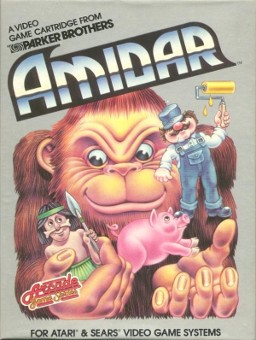
Amidar is a video game developed by Konami and released in arcades in 1981 by Stern. The format is similar to that of Pac-Man: the player moves around a fixed rectilinear lattice, attempting to visit each location on the board while avoiding the enemies. When each spot has been visited, the player moves to the next level. The game and its name have their roots in the Japanese lot drawing game Amidakuji. The bonus level in Amidar is a nearly exact replication of an Amidakuji game and the way the enemies move conform to the Amidakuji rules; this is referred to in the attract mode as "Amidar movement".
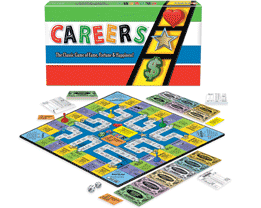
Careers is a board game first manufactured by Parker Brothers in 1955 for $2.97 US; it was most recently produced by Winning Moves Games. It was devised by the sociologist James Cooke Brown. Victory conditions consist of a minimum amount of fame, happiness and money that the player must gain. Players set their own victory conditions before the game begins, the total of which must be sixty or one hundred.
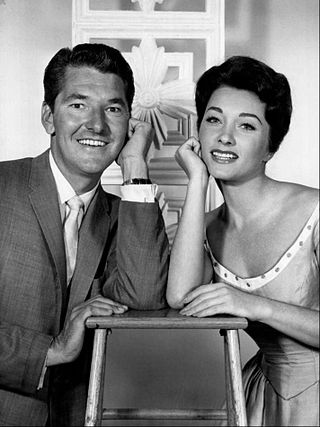
Video Village is an American television game show produced by Heatter-Quigley Productions, which aired on the CBS network in daytime from July 11, 1960, to June 15, 1962, and in primetime from July 1 to September 16, 1960. It was notable for the use of its unique "living board game" concept and for premiering soon after the quiz show scandals.

Tsuro is a tile-based board game designed by Tom McMurchie, originally published by WizKids and now published by Calliope Games.
Duell, also published under other names, is a two-player board game played with dice on a board of 9×8 squares. Players take turns moving one of their dice in order to capture their opponent's pieces, with the ultimate aim of capturing the opponent's key piece to win the game. It is considered a chess variant.

Crosstrack, billed as the "unique track switching game", is an abstract strategy game designed by Philip Shoptaugh and first published in 1994. Players place special track pieces onto an irregular octagon board, winning by being the first to create an unbroken path between two opposite sides. It is an example of a tile-based edge-matching path connection game, similar to the Black Path Game, Trax, and Tsuro, Tantrix and Kaliko, and Octiles.
Laser Chess is a two-player, strategy video game modeled as a board game with chess-like pieces, most of which have mirrored surfaces, and one of which is a laser cannon. Laser Chess first appeared in Compute!'s Atari ST Disk & Magazine in 1987, written in Modula-2, winning the $5,000 first prize in the magazine's programming competition.

Aeroplane chess is a Chinese cross-and-circle board game similar to the Western game of Ludo and the Indian game of Pachisi. Developed in the 20th century, aeroplane chess features airplanes as pieces instead of the more abstract pawns and beehive-shaped pieces found in the games from which it is derived. Aeroplane chess has spread around the world, especially in Africa.

Beagle Bag is a collection of video games for the Apple II family of computers published in 1982 by Beagle Bros. It was released in unlocked and unprotected form and is now in the public domain.

The Game of Life, also known simply as Life, is a board game originally created in 1860 by Milton Bradley as The Checkered Game of Life, the first ever board game for his own company, the Milton Bradley Company. The game simulates a person's travels through their life, from early adulthood to retirement, with college if necessary, jobs, marriage, and possible children along the way. Up to six players, depending on the version, can participate in a single game. Variations of the game accommodate up to ten players.

G.O.O.T.M.U. is a board game that was published by Jolly Games in 1992.

Exorbitare, also known as Quantum Jump, is an abstract board game published by Orca Games in 1981.

















